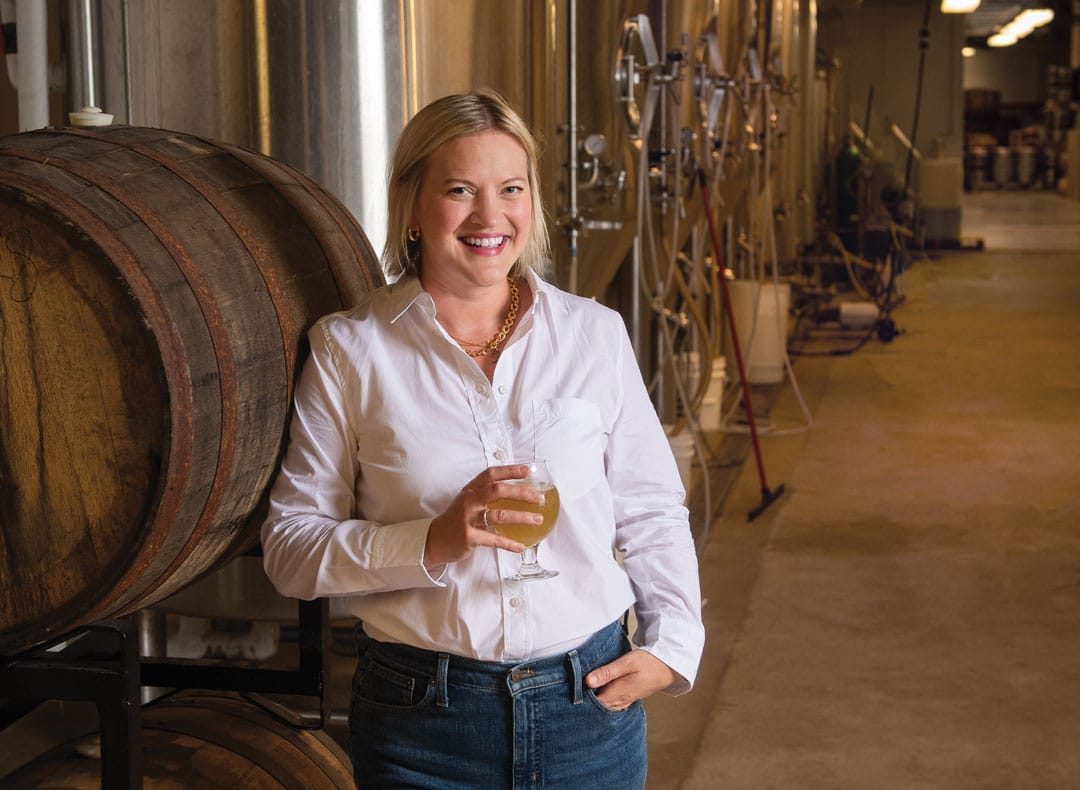Iowa Brewers Guild executive director talks future growth in state’s maturing craft beer scene

Mike Mendenhall Aug 16, 2024 | 6:00 am
14 min read time
3,364 wordsBusiness Record Insider, Economic Development, Innovation and Entrepreneurship, ManufacturingAfter a decade of rapid growth, Noreen Otto, executive director of the Iowa Brewers Guild, sees the state’s relatively young craft beer industry reaching maturity.
Otto has led the not-for-profit industry group, which represents more than 100 members from Iowa’s professional breweries and cideries, since August 2021.
The organization recently partnered with the Iowa Economic Development Authority to release a report that found Iowa’s craft brewing industry had a $1.25 billion impact on the state’s economy in 2022 and is projected to grow to $1.469 billion by 2027.
The positive outlook comes at a time of changes for the industry in Iowa. While brewers like Solon-founded Big Grove complete expansions in Des Moines, Cedar Rapids and Iowa City, Peace Tree Brewing Co., a 15-year legacy brewery and taproom with locations in Knoxville and Des Moines, closes its doors.
Brewers testing and launching hemp-derived, THC-infused seltzers and beverages have had to adjust their products as a state law that went into effect July 1 limits THC to 4 milligrams per serving in consumable products.
Otto sat down with the Business Record on June 19 to talk about the state of craft brewing in Iowa. The conversation was a few days after she returned from a trip to Capitol Hill in Washington, D.C., where she represented the Guild and discussed craft brewing’s economic impact with Iowa’s congressional delegation and other federal officials, stressed community building and continued to develop agricultural partners for the local industry.
This interview was lightly edited and condensed for clarity and brevity:
You’re representing the brewing industry in Iowa during an inflection point in the industry. Craft beer has grown. You’re starting to see new product lines come to market, whether it be seltzers, hemp-infused beverages, just a diversification of people trying things from different areas. How would you characterize the state of Iowa’s brewing industry today?
I use the word maturing a lot when I talk about the industry. We went through this huge explosion of growth before I was in this role, and literally in a few years’ time, the industry doubled in the state of Iowa — just the number of brewing locations with some of the legislative support behind it, home brewers and craft brewers could really take that next step into creating a taproom and a business and the market just opened up. And so we saw this explosion of breweries. And we still see breweries opening up, we see some new ones, we see some shifts in the marketplace, good and bad. But really … now we’re in a maturing and stabilizing point in the industry. I think your observation is exactly right about you’re seeing new, innovative brands and beverages, but also I think trying to find new consumers, new customers to invite into the taproom to experience. And a new focus really on community building I think is really important in 2024.
Iowa breweries generated over $1 billion of total economic impact in the state of Iowa [in 2022]. And I think before it was really, really hyper-focused on brewing an IPA and a cool craft brewery, and now the brewers as they grow and mature and expand, I think we’re seeing more and more regional tourism, as well as becoming these really important anchor tenants in small communities. We now have breweries in 82 different communities around the state. And that’s everything from here right in downtown Des Moines to we have a brewery in Titonka, Iowa, which I had to look up on a map when they joined the Guild. And the role they play in those communities is really similar, regardless of the size of the city, because it’s these really important gathering spaces, and we’re increasingly finding a really consistent tourism stop. And that’s really important from an economic development standpoint; $172 million of tourism dollars is attributed to breweries in the state of Iowa.
I had a member of the brewing community here in Des Moines say to me when people come visit us from out of town in Des Moines, they’re not just stopping at my brewery, we’re either part of a larger schedule they have for the day, or we’re the third brewery they visited on their visit and on their weekend. So we think we play a really important cornerstone part of tourism.
You were recently in Washington, D.C., on behalf of Iowa brewers meeting with lawmakers. Tell us about your trip. What were the priorities, and what are some of the issues that Iowa brewers want to convey to leaders in Washington?
We were out there with the Brewers Association, which is the national association for independent breweries, and talking about a couple of different issues that are important to Iowa brewing. The first thing we’ve been talking about for a couple of years and is of particular interest to us in the state of Iowa is the USPS (United States Postal Service) Shipping Equity Act. So, I don’t know if you’ve ever ordered a bottle of wine or had someone send you one for your birthday, it shows up at your doorstep, your ID has been verified, it gets delivered to you. We don’t have that privilege in the state of Iowa yet. And USPS can’t be the delivery service that does that. We really like this issue because here in the state (of Iowa) we continue to press for direct-to-consumer shipping to allow us to ship out of the state. It would also allow Iowa consumers to ship in if they’re beer collectors or beer hounds. But it would allow our members to reach a new marketplace. And so it’s a really great dialogue for us to have because right now it’s only those private carriers that can do it. And we think, you know, especially when we talk about rural communities, USPS serves a really critical role. We’re always looking for equity with our amazing friends in the wine industry who have done all these incredible things to grow and reach consumers. We would like to do the same thing.
Expand on that. What’s being done to market and distribute Iowa beers beyond the state’s boundaries, which sounds like it’s a component of that?
That’s where we’re the most focused. If you come and visit Toppling Goliath and you’re from Chicago, and if you’re not sure when you’re going to get back to Decorah, and you would love to have a limited release from them, or you stopped in at Pulpit Rock (Brewing Co.), or Pivo Brewery has a beer they make that’s a historic beer and has all these gold medals, so if I want this amazing Nordic beer from Pivo Brewery and I don’t live in the state, I can’t get it right now. It’s not going to get picked up by a distributor at the moment. We would love a consumer to say, “I would love this amazing Iowa product in my fridge for when all my Norwegian relatives come to visit.” We want to send amazing Iowa products out into the world. We’re going to continue to have that conversation.
When you bring that up to lawmakers, what’s the response and what’s the reaction?
I think just first and foremost at the heart of everything we do, we want to make sure it’s safe. We point to our friends in the wine [industry] who have been able to do this for almost a decade and a half. And then the response is a little bit of surprise. Like, we really can’t do this? And I think just more and more as we talk about, especially post-pandemic when we expected so many more products to be able to be delivered to us directly, I think there’s a little bit of incredulity that we can’t already do this. So we’re going to continue those discussions and find a path forward where we can allow the breweries who want to showcase a special beer to be able to do that and then reach to consumers, then still respect the three-tier system here in the state.
Are there any other breweries like Toppling Goliath that are trying to find creative ways to get their products outside of the state? And maybe if you could expand on that and talk about what is the demand right now for Iowa-made beer outside of the state? Do we know?
I’m not sure I can really answer your question because when we talk about beer going out of the state, those are those private distribution contracts that my individual members have. We just want breweries to feel like they have the ability to grow. Our distributors are really critical partners because the infrastructure that’s required to get your product as far and wide as Toppling Goliath does, it’s really important to have those partnerships. We want to make sure they function and the brewery can still be profitable, and still be creative, which is really important. These craft brewers are really passionate. I think our focus really from inside the state is, you know, we leave those individual relationships. That’s not something we’re going to deal with as the association. But what we do talk a lot about is the regional tourism, because we’re working on making sure it’s clear that Iowa beer is literally some of the best beer in the world. I say that a lot.
At the 2023 World Beer Cup, which had over 10,000 beers entered, we had breweries bring home multiple gold medals to the state. Confluence Brewing [Co.] brought home two gold medals in two different brew categories. Backpocket Brewing brought home a gold medal. I joke that they won for their pumpkin beer, which is a very divisive product, right? You love it or you hate it, but they literally brewed the best pumpkin beer in the whole world. And Confluence Brewing is brewing some of the best beer in the whole world. And so our focus is on continuing to raise that quality and have people who want to come to the state of Iowa know that this is a tourism, a craft beer hot spot.
When we were talking about your trip to D.C., you said there were other priorities you were out there to discuss.
We keep an eye on the [five-year federal] farm bill because our industry input is first and foremost water. There’s a couple initiatives right here in the state to focus on water. Our inputs to our end product are agricultural. And so whether you’re making a craft cider, and you need fruit grown in an orchard, or you’re brewing hundreds of barrels here in the state, you need hops, you need malt, you need barley. And, particularly the hops and barley, we want to make sure that those agricultural industries are supported. The farm bill is near and dear to the Iowa [congressional] delegation’s heart, everyone. I got to see all of our members and with every one of them, we touched on the farm bill because crop research is going to continue to be really important. And then we continue here in Iowa to talk about more research and more support with some small cover crops and nontraditional crops that could be really helpful to the brewing industry and to support some of the research they’re doing at Iowa State University.
What kind of cover cropping would be used in Iowa brewing?
So, you’re about to get me like really out of my depth. I’m not a farmer. We’ve had some research shared with us that’s really exciting, exploring ways to use other grains like rye and millet. And then we really want to support the orchards and the fruit that are going into these amazing craft ciders being brewed here in the state. That’s of growing importance here, as we enter the Cider Renaissance, they’re calling it. Hard cider is just really going through this amazing transformation right now. And yeah, so hops traditionally have not grown well here. It’s just too wet. If there’s hops growing out there, it’s in very, very small quantities, and so we want to explore what are other ways in this, like, basket of bounty that we can support that.
With Iowa’s new hemp THC restrictions, brewers have been speaking out on what the impacts could be, based on THC levels allowed. What are brewers currently telling you, and what do they need with this law going into effect?
So, our mission as the Iowa Brewers Guild is always going to be, first and foremost, craft beer-centered. But we have a growing number of our brewery members who are either interested in manufacturing this product or selling it because they want to meet consumer demand. Our position has been very clear: No. 1, we support age restriction. Our members were doing that already before it was legally required here in the state. And our second piece was clear regulatory authority with a department here in the state of Iowa. And I think that’s what we continue to hear from our members is [they] just need clarity about what the expectation and requirements are, whether you’re manufacturing it or selling it, and we will continue to share that message. We just need to have HHS [Health and Human Services] be ready and willing and able to answer questions that our members have before they make an investment or decide not to carry this product. There’s a little bit of unknown right now, and we’re hoping that will be resolved sooner [rather] than later. Every one of my members is a small business operating in the state of Iowa, and having gray areas is not a great way to spur responsible business investment and actions. So we’re hoping there’ll be clarity coming.
Talk a little bit more about that growth the Iowa craft beer industry has seen over the last decade and what’s projected over the next 10 years. What are you all expecting?
Our economic impact study told us that Iowa brewing is projected to continue growth, including 17.5% growth and total output and an almost 10% increase in jobs. And that’s really important because we’re talking about jobs and brewing jobs and hospitality, but also all that infrastructure that surrounds craft brewing in distribution and things like that. So we think it’s not going to be that boom we saw in the late 2010s, but we think more stability and more maturity as these breweries continue to explore their role both on the retail shelf and in the community. The retail beer market has stabilized a little bit post-pandemic, but it can be pretty crowded on those shelves. Keep in mind, these breweries have taprooms, and so what we call on-premise consumption, where literally someone’s pouring your beer from a tap to consume, has really not recovered since the pandemic. That was a discussion we also had in Washington, D.C. – the Cheers Act would allow for some continued investment and financial support for brewers in places that invest in that tap equipment and kegs and things like that just to support that on-premise, in-person experience, which is such a part of craft brewing culture.
How are your members handling the fewer folks going to the taprooms? What’s been the response and what would have been some of their solutions?
We want to invite everybody in, so from our discussion talking about some new beverage lines and new opportunities, craft brewers are incredibly creative and incredibly welcoming. And so when you put those two things together, you get a situation where taprooms are being used for more things than ever. They’re becoming these really important community gathering spaces. We have been working a little bit with Iowa Corn, and when they first came to talk with us at the Guild, I was thinking, ‘Oh, it’s because we make beer out of corn. Well, we do make some beer out of corn, but it’s really because they are all about the importance of community at the heart of rural Iowa, and really saw that message parallel with what we do. And so they have hosted gatherings in these taprooms and small towns around the state. And we love that. That’s at the heart of what we do. We talk a lot about two parts. One is what goes in the glass should be absolutely like the most delicious beer and you should have an option that you like. Maybe it’s a beer, maybe it’s an N/A [nonalcoholic], maybe it’s gluten-free, maybe it’s a seltzer or a hard spirit that they’ve worked on as a brewery. But the other part is sharing that experience with other people. And that’s the community part, and we want to keep working on that, too. So our slogan is drink beer, make friends. And so it’s drink this amazing beer made here, but also do it as part of a community with your friends. So I love watching what all our breweries are doing physically in their taprooms and who they’re inviting in. And so I tell people all the time like I’ve been to birthday parties, I’ve thrown a surprise party. I’ve been to a PTA meeting at a brewery. I’ve been to a book club at a brewery. I’ve seen weddings happen at a brewery. We host our legislative reception in a brewery, trivia nights and book sales and plant swaps and bike meetups, both bicycles and motorcycle meetups. So, really, I think breweries are leaning into that more than ever, welcoming people into the taproom.
… This [brewery work] is a physical job, and there are a lot of consumer trends to keep an eye on. I think it’s a reminder that we have to continue to be inventive and to meet consumers where they’re at. We’ve seen a huge increase, it’s still very, very small, but the demand for N/A beer options and good N/A beer options has really increased as well as different flavors, gluten-free options, ciders and seltzers. We’re working to change the laws here in the state and give the brewers the tools so they continue to do more things and be agile, flexible, small-business owners, which is going to be the key.
One of my favorite things about the craft-brewing experience is the embrace of local artists. You see it not only on can labels but lined on walls, and it’s really working that local art element into branding and its marketing. Talk about that trend.
I think it’s local artists and knowing who your community is and where you fit in your community and highlighting those local artists. But I think it’s also your local issues and your local partners, too. So really, a lot of cause marketing, a lot of charitable brewing happens. It’s not just like working with your community, but it’s also like supporting a cause that’s important to your community. And I think because our breweries are so, so vocal, they can be really in touch with whether it’s highlighting a local favorite artist, or hey, we’re right on the bike trail, so we’re going to have all bike-themed art. That’s really popular and it works with our brand, we want to support the local softball team. We want to raise money for clean water and sustainability, which is a growing partnership we see. This is a little bit of a pivot but one of the other things that’s really exploded here in the last year was the partnership with colleges. Exile Brewing here [in Des Moines] brewed the Swarm [beer] to support the University of Iowa, but we’ve seen partnerships now with UNI, with Drake University, with Central College and on and on. And it’s really, again, that acknowledgement of when you know who your patrons are, you know your role in the community, you support that and you want to celebrate the alumni and that larger community. It’s a perfect partnership that a big brand might not be able to do, but your local craft brewery is willing and able and interested in doing because they know who their audience is.

Mike Mendenhall
Mike Mendenhall is associate editor at Business Record. He covers economic development, government policy and law.










